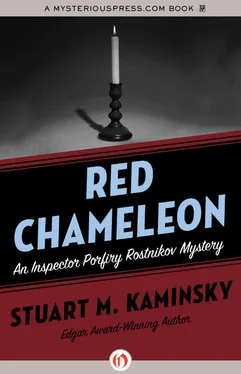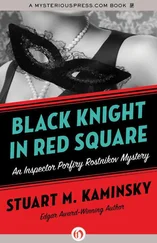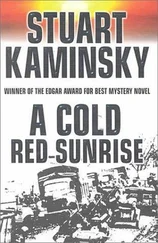Stuart Kaminsky - Red Chameleon
Здесь есть возможность читать онлайн «Stuart Kaminsky - Red Chameleon» весь текст электронной книги совершенно бесплатно (целиком полную версию без сокращений). В некоторых случаях можно слушать аудио, скачать через торрент в формате fb2 и присутствует краткое содержание. Год выпуска: 2012, ISBN: 2012, Издательство: MysteriousPress.com/Open Road, Жанр: Полицейский детектив, на английском языке. Описание произведения, (предисловие) а так же отзывы посетителей доступны на портале библиотеки ЛибКат.
- Название:Red Chameleon
- Автор:
- Издательство:MysteriousPress.com/Open Road
- Жанр:
- Год:2012
- ISBN:978-1-4532-6632-8
- Рейтинг книги:4 / 5. Голосов: 1
-
Избранное:Добавить в избранное
- Отзывы:
-
Ваша оценка:
- 80
- 1
- 2
- 3
- 4
- 5
Red Chameleon: краткое содержание, описание и аннотация
Предлагаем к чтению аннотацию, описание, краткое содержание или предисловие (зависит от того, что написал сам автор книги «Red Chameleon»). Если вы не нашли необходимую информацию о книге — напишите в комментариях, мы постараемся отыскать её.
Red Chameleon — читать онлайн бесплатно полную книгу (весь текст) целиком
Ниже представлен текст книги, разбитый по страницам. Система сохранения места последней прочитанной страницы, позволяет с удобством читать онлайн бесплатно книгу «Red Chameleon», без необходимости каждый раз заново искать на чём Вы остановились. Поставьте закладку, и сможете в любой момент перейти на страницу, на которой закончили чтение.
Интервал:
Закладка:
The message had been given to Porfiry Petrovich Rostnikov over the phone. It was brief, informative, and carried far more than its message. Rostnikov had grunted and the new assistant procurator, Khabolov, hung up before Rostnikov could reply, “Yes, comrade.”
The assistant procurator’s words were a reminder that Inspector Rostnikov was now reduced to handling insignificant Moscow murders and that one could mention “Jews” to him in a patronizing way. Rostnikov’s wife, Sarah, was Jewish. The assistant procurator certainly knew this. If Sarah were not Jewish, Rostnikov himself would probably have been making the call to an inspector while he, Rostnikov, sat in the assistant procurator’s chair in a small office with a cup of tea in his palms.
In Moscow, the investigation of a crime is a question of jurisdiction, and the investigation of important crimes is an important question of jurisdiction. Minor crimes, and no one is quite sure what a minor crime is, are handled at the inquiry stage by MVD, the national police with headquarters in Moscow. Moscow itself is divided into twenty police districts, each responsible for crime within its area. However, if a case is considered important enough, a police inspector from central headquarters will be assigned. The doznaniye, or inquiry, is based on the frequently stated assumption that “every person who commits a crime is punished justly, and not a single innocent person subjected to criminal proceedings is convicted.” This is repeated so frequently by judges, procurators, and police that almost everyone in Moscow is sure it cannot be true. This assumption of justice is also made for military and state crimes handled by KGB investigators, who determine for themselves if the crime is indeed a state or military crime. Major nonmilitary crimes, however, are within the province of the procurator’s investigator, who is responsible for a predvaritel’noe sledstvie, or preliminary police investigation.
All police officers in the system work for the procurator’s office. The procurator general is appointed to his office for seven years, the longest term of any Soviet officer. Working under him or her are subordinate procurators, who are appointed for five years at a time. The job of the procurator’s office is enormous: to sanction arrests, supervise investigations, oversee appeals at trials, handle execution of sentences, and supervise detention. The procurator general’s office is police, district attorney, warden, and if necessary, executioner. The procurators of Moscow are very busy.
Rostnikov had stood behind his desk in a small cubbyhole office at the Central Petrovka station, straightened his left leg as best he could, and sighed deeply. The leg, partly crippled when he confronted a German tank in the battle of Rostov, had been giving him more trouble recently. Rostnikov catalogued the possible reasons for this increased aching. First, he was simply, at fifty-four, getting older, and with age came pain. Second, since the failure of his scheme to obtain exit visas for his wife and himself, he had spent more and more time working with his weights in their small apartment. The trophy he had won a month earlier gleamed bronze and small in front of him, and he found it easy to lose himself in the pain and the strain of the weights. One morning he had heard a uniformed duty officer say to another as he passed Rostnikov, “That washtub is looking a little washed out.” Rostnikov did not object to being known as the Washtub. He rather liked it. What disturbed him was that he not only agreed with the assessment that he seemed washed out, but he took some comfort in it.
“Zelach,” Rostnikov had called, throwing his jacket over his arm and going into the long, dark room outside his office. The room was modern, clean, filled with desks and men working behind them.
Zelach had looked up as if awakened from a mildly pleasant dream. He was reliable, slow of mind and foot, and the only help Rostnikov had been allowed since his informal demotion.
Zelach stood and followed. He had no curiosity and thus asked no questions as he followed Rostnikov down the aisle of desks past men at their solitary task of filling out reports. None of the actual interrogation was done out there. Interrogation, which could take hours or days if necessary, was normally carried on in small rooms down another corridor. The rooms could be made extremely warm or extremely cold, depending on the investigating officer’s assessment of the suspect or the witness.
Rostnikov did not try to divert his eyes from the third desk, the desk of Emil Karpo, who had nearly died a month earlier in an explosion in Red Square. Since his return to duty, his right arm lying limp in a black sling, Karpo had been even less communicative than before. Karpo, he thought, had a look of death in his eyes. It was, Rostnikov knew, an old man’s thought, the thought that things were better in the past and would only get worse in the future.
“What?” said Zelach, now at his side as he passed the desk.
“I said nothing,” said Rostnikov, though he was not at all sure that he had said nothing.
In front of Petrovka they hurried to the metro. Zelach had not, in the past month, appeared to notice that Rostnikov no longer had access to a car and driver or that the cases he was assigned were far below the level of social and political import of those in the past. In some ways, Rostnikov envied his lumbering assistant. If you do not let the world in, if it seems unchanged, it can cause you no pain. Nichevo, he thought, nothing. Never let anything bother or surprise you. Be resolved to accept anything and nothing.
As he dropped his five kopeks into the metro’s turnstile slot, Rostnikov turned to Zelach. “What would you say if I were to tell you that you have been deemed a political liability and that I would have to shoot you in the next ten seconds?”
Zelach, instead of looking puzzled at the question, let a frightened-looking man in a workman’s cap squeeze by them and then answered, “Good-bye, Comrade Rostnikov.”
“As I thought,” said Rostnikov, hearing a train rumble below them and rise to a roar that ended conversation.
On the escalator ride down, Rostnikov reflected for the thousandth time that he had been the victim of terrible timing and overconfidence.
The plan had been dangerous but simple, but chance, which should always be reckoned with, had laughed at him. Chance and accident had always played a part in the life of Steve Carella and the 87th Precinct, the American novels purchased on the black market that Rostnikov loved and kept hidden in his apartment behind the Russian classics and the collected speeches of Lenin.
Chance had failed to crown Rostnikov’s plan. He had set up an elaborate blackmailing of a KGB senior officer named Drozhkin that involved Rostnikov’s silence concerning the cover-up and the KGB assassination of a well-known dissident and Rostnikov’s assurance that the official reports, which were with a friend in West Germany, would not be released if exit visas for Rostnikov and his wife were issued. It was to have been processed as a routine exit visa for a dissident Jew and her husband with special permission for a police officer to depart based on his years of loyal service in both the military and the government.
However, Brezhnev had died, and Andropov had taken over. Andropov had been a friend and admirer of Drozhkin’s and when Andropov took over, Drozhkin had been promoted, which meant he spent more quiet days on his dacha in Lobnya. And then Andropov had died, followed quickly by Chernenko’s death, which confused the situation even further. It had all gone wrong. Drozhkin had simply refused to deal with him. Rostnikov could have committed suicide by having the papers released in Germany to the Western press. As it was, there was still the threat of release, and at some level of the KGB apparently a decision had been informally or formally made. A stalemate existed. Rostnikov would not be allowed to leave the Soviet Union. However, he would not lose his job or be driven to complete despair, which might make him release the embarrassing report. It was a chess game in which the police officer had been outmaneuvered by the KGB. In this case, the stalemate had been a victory for the KGB.
Читать дальшеИнтервал:
Закладка:
Похожие книги на «Red Chameleon»
Представляем Вашему вниманию похожие книги на «Red Chameleon» списком для выбора. Мы отобрали схожую по названию и смыслу литературу в надежде предоставить читателям больше вариантов отыскать новые, интересные, ещё непрочитанные произведения.
Обсуждение, отзывы о книге «Red Chameleon» и просто собственные мнения читателей. Оставьте ваши комментарии, напишите, что Вы думаете о произведении, его смысле или главных героях. Укажите что конкретно понравилось, а что нет, и почему Вы так считаете.












